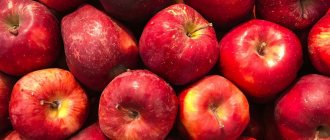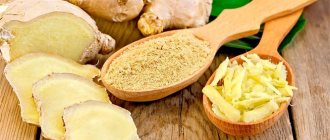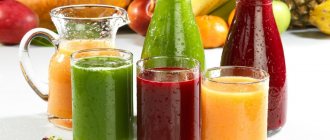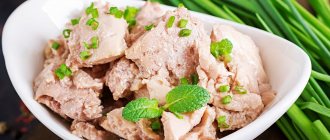For any gastrointestinal pathologies, it is important to follow a diet, because The patient’s well-being depends on proper nutrition. Often you have to exclude foods from your diet that are considered healthy for most people. For example, an apple cannot always be consumed for heartburn.
When gastrointestinal pathology appears, you have to exclude some foods from the diet.
Symptoms of stomach heartburn
Heartburn is a damage to the lining of the esophagus, not a disease.
This condition is always a sign of some pathology, so you cannot treat it yourself. To detect the root cause of gastrointestinal disorders, it is important to consult a doctor when the first symptoms of a burn to the esophagus occur. Among them:
- cough;
- hoarseness;
- feeling of a lump in the throat;
- change in taste (usually bitterness or acidity in the mouth);
- burning sensation in the throat, nasopharynx or stomach;
- belching.
What is the danger of the disease without treatment - the main complications
The main danger is the disease that caused heartburn. He definitely needs to be found and cured. And reflux itself is dangerous, since with prolonged exposure to acid on the esophagus, esophagitis, an inflammatory disease, can develop. A chronic inflammatory process can cause mucosal degeneration and cancer.
Erosion and peptic ulcers may form, which lead to bleeding. In some cases, narrowing of the esophagus (scar strictures) appears, which does not allow food to be taken normally - it is difficult to swallow.
Danger of heartburn
Many people ignore the symptoms of a burn to the esophagus, mistaking it for a temporary illness.
However, seemingly harmless sensations can cause the development of GERD - gastroesophageal reflux disease. This pathology causes severe weight loss and critical damage to the gastrointestinal tract. Signs of heartburn progression:
- severe vomiting;
- problems with swallowing;
- cutting pain in the abdomen;
- labored breathing;
- appearance in saliva or vomit of blood and bile.
People who are at risk of developing GERD need to be doubly careful when dealing with heartburn.
These include:
- pregnant women;
- elderly;
- smokers;
- persons who abuse alcohol;
- obese;
- patients with hiatal hernia.
In rare cases, asthma and allergies (the respiratory form) may affect the likelihood of developing gastroesophageal reflux disease. Also, people who are recovering from surgery on the gastrointestinal tract should not neglect their diet, because... surgical interventions often cause a temporary delay in gastric emptying.
When experiencing heartburn, pregnant girls need to be doubly careful, since they are included in the group of development of GERD.
Preventive measures
The child must change lifestyle and eating habits:
- do not lie down after eating, do not bend over;
- sleep on a high pillow;
- do not wear tight clothes, belts, corsets;
- do not lift heavy objects;
- lose weight;
- do not overeat;
- eat warm food, not hot or too cold;
- do not overeat at night - the last meal should be 3-4 hours before bedtime;
- give up spicy, fried, fatty foods, marinades, sour vegetables and fruits;
- do not drink strong tea, coffee, fruit drinks, sour juices;
- do not take medications that cause heartburn.
Sources:
- N.V. Lyarskaya. Modern aspects of the etiology, pathogenesis and clinic of gastroesophageal reflux disease in children // Bulletin of VSMU, 2008, vol. 7, no. 2.
- P.L. Shcherbakov, A.N. Zablodsky. Gastroesophageal reflux disease of children: the role of endoscopy // Experimental and clinical gastroenterology, 2014, issue 101, No. 1, pp. 66-73.
Vostrikova Ekaterina Borisovna Clinic
Author of the article
Vostrikova Ekaterina Borisovna
Specialty: gastroenterologist
Experience: 14 years
The information in this article is provided for reference purposes and does not replace advice from a qualified professional. Don't self-medicate! At the first signs of illness, you should consult a doctor.
Are apples a food that causes heartburn?
Apples themselves are not harmful and are even beneficial for the gastrointestinal tract, but in some cases they can cause severe damage to the esophagus.
The most common causes of heartburn after eating these fruits:
- Fast digestion. Apples are easily digestible, but gastric juice is often produced more than necessary. Because the food for which it is intended has already passed into other parts of the gastrointestinal tract, and minor releases of enzymes into the esophagus occur. As a rule, this condition is not dangerous, and a person’s well-being quickly returns to normal even without the use of medications.
- Eating apples on an empty stomach. Due to the high content of ascorbic acid, these fruits often cause a violent reaction in the stomach and, as a result, burns of the esophagus.
- Insufficient shredding of the peel. It is difficult to digest and, as a result, causes increased production of enzymes in the gastrointestinal tract.
- Too sour varieties. The reason is vitamin C, which often provokes increased activity of gastric juice. In most cases, symptoms can be relieved using a sorbent.
What to do to diagnose the disease?
It is necessary to find the cause, that is, the disease that causes heartburn. To do this, you need to contact a pediatric gastroenterologist with your child, who will examine the patient, interview him for complaints, and collect an anamnesis of the disease. Already from the results of the first consultation, you can understand a lot and prescribe initial therapy. The following types of diagnostics may be recommended:
- FGDS, during which a biopsy of a suspicious area of the mucous membrane can be done. Fibrogastroduodenoscopy allows you to determine the acidity of gastric juice and test for Helicobacter Pilori.
- X-ray of the stomach and esophagus - if it is impossible to do FGDS. A less informative method, but it can detect narrowing of the esophagus and hiatal hernia.
- Esophageal manometry - makes it possible to determine the peristalsis of the esophagus and the work of the sphincters.
- Daily pH-metry of the esophagus - measurement of pH levels in various parts of the stomach, duodenum and esophagus. It is carried out if there is a suspicion of a disease accompanied by a change in acidity levels. Allows you to determine treatment tactics for gastritis, ulcers, duodenitis, etc. Source: P.L. Shcherbakov, A.N. Zablodsky Gastroesophageal reflux disease of children: the role of endoscopy Experimental and clinical gastroenterology, 2014, issue 101, No. 1, pp. 66-73
Pregnancy and apples for heartburn
In the first trimester, it is doubly important to ensure compliance with the correct diet, because... the body undergoes many changes, which often cause the development of gastrointestinal pathologies. If heartburn occurs, pregnant women can only eat sweet varieties of apples. However, you should avoid eating such fruits before bed, because... they are highly susceptible to fermentation in the stomach in case of any delay in the functioning of digestion.
Pregnant women with heartburn can only eat sweet varieties of apples.
How to get rid of heartburn with apples
If the etiology of heartburn is unknown, it is better to avoid eating foods high in vitamin C. However, if prepared correctly, the apple can still be used to relieve the symptoms of a burn to the esophagus.
Ground fruit
Fruit puree can reduce acidity, but only if you choose a sweet variety. It’s not difficult to prepare such a medicinal dessert: just grind the pre-peeled fruit using a blender or grater.
Apple with kefir
Since kefir contains enzymes and prebiotics that normalize the functioning of the gastrointestinal tract, this fermented milk product can be consumed for heartburn.
To quickly get rid of unpleasant sensations, as well as replenish the necessary vitamins, the drink can be mixed with applesauce.
Methods for treating heartburn in children
Parents first of all think about what they can give their child for heartburn in order to quickly relieve the symptoms. However, therapy is more complicated. It includes taking medications, diet, and lifestyle changes.
Drug treatment
If the problem cannot be solved by diet and proper eating habits, the doctor may prescribe the following to the child:
- antacids – acid neutralizers;
- drugs that reduce the production of gastric juice;
- agents that stimulate the tone of the lower esophageal sphincter;
- Prokinetics – drugs to normalize the movement of food through the gastrointestinal tract.
Diet
The simplest home remedies are:
- to drink a lot of water;
- drink a glass of cold milk;
- eat cold food and even ice cream.
You need to eat fractionally - 4-5 times a day in small portions. From the child’s menu you need to exclude everything that provokes heartburn:
- fatty, fried, sour, smoked;
- sauces, hot seasonings;
- soda, strong tea and coffee;
- chocolate;
- tomatoes and citrus fruits;
- citrus fruit juices;
- onion;
- sour cream, cottage cheese;
- yeast baked goods.
The following will be useful: lean boiled meat, porridge, steamed vegetables, low-fat dairy products, bananas, apples, rice and oatmeal, potatoes, cabbage, fish and poultry, eggs, white bread, mineral water.
Food can be baked, boiled or steamed.
Some nutrition rules
- After feeding, the baby should be kept in an upright position for about 30 minutes.
- Leafy vegetables and milk help well.
- You need to eat often and in small portions.
- After eating, do not lie down for 30-45 minutes.
- Sleep on a high pillow.
- Don’t overeat, don’t eat in a hurry and “on the go.”
- Chew your food well.
How to eat apples for people suffering from frequent heartburn
Since tasty fruits are not always useful for gastrointestinal diseases, it is important to choose the right varieties and methods of their preparation.
In what form to use
Only sweet varieties of apples can be consumed fresh. Before eating this fruit, remove the skin and cut out the seeds. It is better to puree the fruit, but you can also eat it sliced.
How often can you eat apples?
Since foods containing a lot of ascorbic acid can cause hyperactivity of stomach enzymes, it is recommended to eat them no more than 2 times a week.
If heartburn is episodic and occurs only due to overeating, you can eat apples more often. Information sources:
V. V. Tikhonovets, A. N. Andreeva... - Real clinical practice of medical prescriptions for heartburn in pregnant women - source V. A. Ostapenko, S. S. Bunova, A. V. Polyakov... - Features of enteral nutrition in gastroesophageal reflux disease - source M. O. Krlykova, D. A. Mironov, N. V. Sviyazova... - Proper nutrition as a healthy lifestyle - source A. Tolstykh - Dietary nutrition for diseases of the gastrointestinal tract - source N. N. Silivonchik - Heartburn in pregnant women - source KL Oliver, GJ Davies - Heartburn: influence of diet and lifestyle - source K. Oliver, G. Davies, P. Dettmar - Diet and lifestyle as trigger factors for the onset of heartburn - source R. Berlin, TN Gates, T. Simon - Method for preventing heartburn - source
Why does a child have heartburn?
The main causes of heartburn in children:
- An unlimited amount of simple carbohydrates in the diet (buns and sweet pastries, potatoes, pasta, fruits and honey), consumption of sweet carbonated drinks, spicy and fatty foods, constant overeating is a direct path to gastrointestinal pathologies.
- Wearing tight clothing that puts pressure on the abdominal area can also contribute to discomfort in the esophagus.
- Some neurological disorders .
- Acute gastritis is a disease in which the gastric mucosa is damaged due to poor nutrition. The child also feels pain after eating, heaviness in the stomach and belching.
- Cystic fibrosis.
- Food allergies.
- Scoliosis (causes heartburn due to excess pressure on the walls of the stomach by neighboring organs due to incorrect posture).
- Inflammation of the mucous membranes of the esophagus , or esophagitis. Heartburn is most typical for the dyspeptic form of this disease. Esophagitis also manifests itself as a burning sensation in the esophagus and belching, often involuntary and loud. Symptoms peak within an hour and a half after eating.
- Hernia in the esophageal opening of the diaphragm . This disease is quite common in children. Its occurrence is due to the fact that part of the stomach moves upward through the esophageal opening to the chest cavity. The cause of the hernia is the failure of the diaphragm and the lack of rigid fixation.
- Malfunction of the cardinal sphincter . The cardinal sphincter is a muscle located at the border of the esophagus and stomach. After food passes from the esophagus into the stomach, this muscle closes the lumen. Insufficiency of sphincter function may be associated with a congenital defect, poor nutrition (frequent consumption of foods that irritate the gastric mucosa: chocolate, spicy seasonings, etc.).
- Reflux gastritis , or chemical gastritis. This disease can develop if a child takes non-steroidal anti-inflammatory drugs, potassium and iron supplements for a long time. Reflux gastritis can also manifest itself as a feeling of heaviness in the epigastrium (“in the pit of the stomach”), nausea after eating.
Up to 4 months, about 50% of children are susceptible to acid reflux - the backflow of acid from the stomach into the esophagus. This is due to the immaturity of the digestive tract and causes heartburn.
In children over 5 years old, acid reflux occurs for other reasons:
- eating junk food - chocolate, fried foods, sugar, carbonated drinks;
- incomplete closure of the esophageal sphincter;
- improper diet;
- binge eating;
- habit of eating a lot before bed;
- excessive physical activity;
- tight clothes;
- obesity;
- frequent lifting and bending of the body;
- some drugs, for example Aspirin, Ibuprofen;
- stress.
In adolescents, these reasons are added to: smoking and first attempts at alcohol.
Typical symptoms of heartburn in children
In young children, diagnosis is complicated by the fact that the baby cannot talk about his condition. The main signs that a child is suffering from heartburn are:
- irritability and tearfulness after eating;
- arching of the back;
- gases;
- suffocation (the child does not have enough air);
- dry mouth;
- loss of appetite;
- nausea;
- unpleasant belching. Source: N.V. Lyarskaya Modern aspects of the etiology, pathogenesis and clinic of gastroesophageal reflux disease in children // Bulletin of VSMU, 2008, vol. 7, no. 2
If you observe similar symptoms in your child, you should report them to your doctor.











